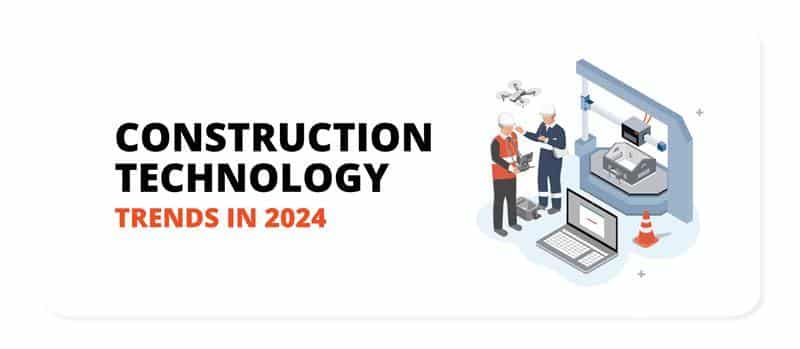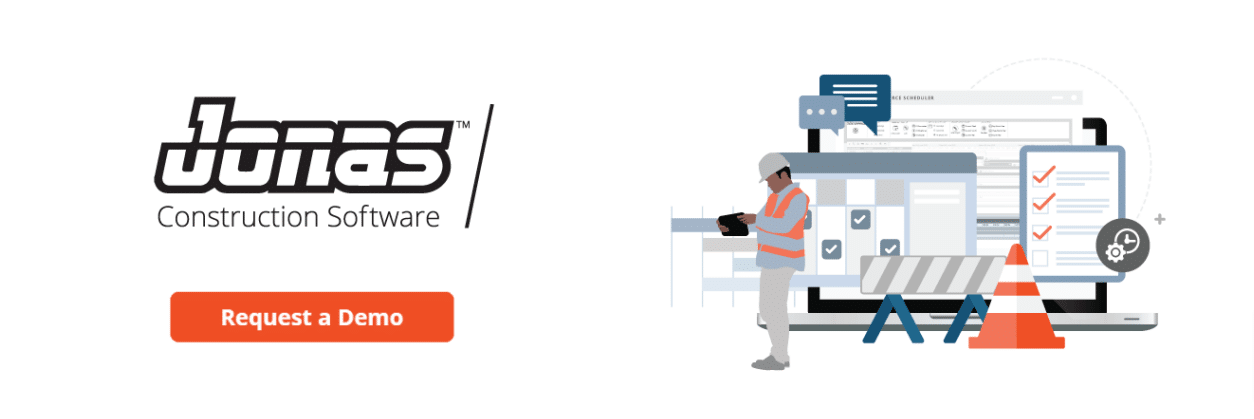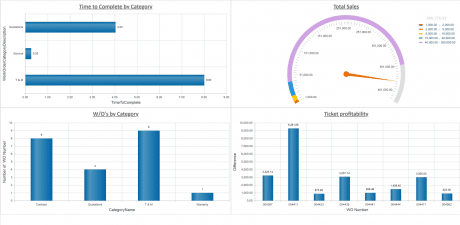Last Updated on April 10, 2024

What are the Construction Technology Trends of 2024?
The construction industry is undergoing a significant transformation. Innovations, economic uncertainty, construction workforce shortages, and other factors have forced service and construction companies to change the way they work and deliver their projects.
In 2024, we can expect to see an increased application of technology trends in the industry. Here are some of the construction technology trends that will dominate in 2024:
-
- Additive Manufacturing
3D printing technology is becoming more accessible and affordable, allowing construction companies to create customized building components on-site or in a controlled environment. This technology can lead to reduced material costs, shorter construction durations, and improved quality of building operations. -
Construction Drones
Unmanned aerial vehicles (drones) are being used to inspect construction sites, monitor progress, and capture real-time data. Drones can improve safety, efficiency, and cost savings by reducing the need for manual inspections and providing valuable data for project management. -
Building Information Modeling (BIM)
BIM is one of the most promising construction technology trends in 2024. BIM now goes beyond traditional 3D modeling, incorporating advanced data analytics and real-time collaboration tools. This shift promises enhanced project coordination, reduced errors, and improved overall project efficiency.
Through 2024, BIM’s use will be impacted by the emerging capabilities of 3D printing, augmented reality technology, and improved sharing and communication through cloud frameworks.
BIM software solutions are suitable for a wide range of projects, from residential to commercial and industrial. They aid construction companies in enhancing financial management by focusing on cost-efficiency and the return on investment from technological initiatives. Additionally, BIM software helps in refining the project scope, offering scalable solutions that cater to various project sizes and levels of complexity. -
Artificial Intelligence (AI) and Machine Learning
McKinsey & Company’s recent study reveals the growing use of AI-powered algorithms in every phase of construction, encompassing design, preconstruction, construction, operations, and asset management.
AI and machine learning also have potential applications in enhancing safety at construction sites. Through analyzing data from sensors and cameras, AI can detect potential hazards and prompt workers to take preventive measures. This approach aims to reduce accidents and injuries at construction sites. -
Cloud-Based Construction Technology Solutions
Cloud-based construction technology solutions offer a significant advantage in accessing real-time data from any location at any time, and are often offered by many construction software providers now. This feature allows project managers to monitor progress and make quick decisions. These solutions provide a centralized platform for managing projects, which simplifies workflows and improves communication among team members.
Moreover, these technologies enhance safety features. Some platforms, for example, employ AI and machine learning to analyze data and identify potential safety hazards. Recognizing these risks early enables construction companies to take proactive measures, thereby decreasing the chances of accidents and injuries. -
Sustainability
The construction industry is increasingly focusing on sustainability, with a focus on reducing waste, using renewable materials, and minimizing energy consumption. This trend is expected to continue in 2024, as clients become more aware of the environmental impact of construction and demand eco-friendly solutions. - Modular Construction
Modular construction involves the use of prefabricated building components that can be easily assembled on-site. This approach can lead to reduced construction time, lower costs, and improved quality.
Modular construction is expected to gain traction in 2024 as the construction industry seeks more efficient and sustainable building methods.
- Additive Manufacturing
Essential Construction Technologies that Should Be Used in 2024
Now that we’ve discussed the construction technology trends of 2024 to watch out for, let’s go over some essential construction technologies your service and construction business should be implementing to reduce cost overruns and maintain an operationally efficient, profitable business.
Construction Business Intelligence & Data Analytics
Construction business intelligence and data analytics are gaining prominence in the industry. Utilizing real-time data and automation to produce accurate reports on demand can help mitigate risks before they become an issue and reveal insights on how to streamline workflows to be more operationally efficient.
Construction businesses can customize business intelligence reports to monitor specific KPIs (key performance indicators) and view data in real time and in different visual formats to help them better understand their operations and reduce profit fade.
Businesses that wish to utilize construction business intelligence (BI) and reporting to optimize their business should evaluate the accuracy of the data their business intelligence tool is extracting data from. Superior business intelligence and construction reporting relies on construction software that integrates the field and back office operations in real time, and can transform vast operational data into accounting and cost data.
Embracing Integrated Construction Software Solutions
A recent McKinsey report highlights the construction industry’s shift towards integrated software platforms, designed to meet customer needs more effectively. This movement is anticipated to persist in 2024, as adopting integrated construction software solutions often translate to enhanced efficiency and productivity.
Integrated construction solutions facilitate streamlining the construction process by providing a unified source for all service contracts and project-related data. This approach minimizes errors, rework, and delays, ultimately resulting in cost savings and a better return on investment.
Furthermore, the adoption of integrated software enables construction companies to efficiently utilize 3D models and BIM software for developing large-scale, complex projects. This leads to increased productivity and shortened project timelines.
Continuing to Digitize Construction Processes
Deloitte Insights suggests that digitization in the construction industry entails fundamentally altering its operating model, rather than just digitizing current building practices. This shift requires construction companies to embrace advanced technologies such as construction software, AI, machine learning, and cloud-based solutions to improve project management, safety, and operational efficiency.
A primary benefit of digitizing construction processes is the use of real-time data for making informed decisions. This strategy improves project management, reduces errors, and increases productivity.
Stay on Top of Construction Technology Trends and Mitigate Risks with Jonas Construction Software
In an era of continuous evolution in the construction industry, keeping abreast of the latest technology trends is crucial for businesses to stay competitive in the marketplace.
By strategically investing in construction software technologies that can help their business understand the true state of their costs and offer insights to continuously improve their operations, construction businesses can confidently assess which construction technology trends they can plan and budget for to excel their business.
As a comprehensive construction management solution integrated with construction accounting and payroll software, Jonas Construction Software is supported by real-time accounting to enable service and construction businesses to have accurate accounting, financial and operational data information at any given moment. As a result, businesses can use this information to make informed decisions to improve their operational efficiency, and ultimately, improve their profitability.
To learn more about how Jonas can help your business improve operational efficiency, reduce cost overruns and identify profit fade in 2024 contact us today or request a demo.





